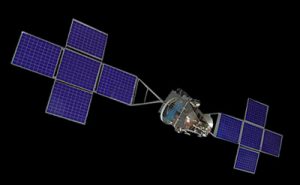
The Iran Space Agency (ISA) announced on March 1, 2017, that it had applied to the International Telecommunications Union (ITU) for five geostationary (GEO) orbital slots for Ka- and Ku-band communications satellites.
The announcement was made on the ISA website, and provided no details about when it expects to fill the orbital slots it has applied for, and with which particular satellites.
Under ITU rules, Iran has a limited time period to place satellites in orbital slots allocated to it otherwise it will lose them and will have to reapply for other orbital slots. Iran has previously applied to the ITU for orbital slots but has not placed satellites in them within the allotted time period.
The ISA announcement did say, however, that it is in extensive discussions with the ITU about the orbital slots, and is also engaged with other countries about frequency coordination.
Iran is at the start of a communications satellite procurement process, and it is understood that companies from China, France, Russia, and South Korea have expressed interest in bidding on the project, called the National Communications Satellite (NCS).
Most of the companies interested in the Iranian NSC programme have not been named, but it is not much of a challenge to identify who they might be. The Chinese company could well be the China Aerospace Science and Technology Corporation; the South Korean company is likely to be either Korea Aerospace Industries or the Satrec Initiative. Identifying the Russian company interested in building Iran’s NCS is a little more challenging since there are so many manufacturers, but a leading contender is likely to be JSC Information Satellite Systems – Reshetnev Company based in Krasnoyarsk, Russia.
In October 2016, the French ambassador to Iran, François Sénémaud, revealed that Paris-based commercial satellite communications company Eutelsat is seeking to provide a communications satellite to Iran.
The ambassador’s remarks were made during a meeting with Iranian minister for Communications and Information Technology Mahmoud Vaezi in Tehran.
“The Eutelsat company seeks to cooperate with the Iranian Space Agency and prepares its draft in order to participate in the tender for the construction of a satellite,” said Ambassador Sénémaud at the meeting, according to Iran’s Fars News Agency.
The Iranian application to the ITU for five orbital slots suggests that the NCS programme could be larger than originally thought. Iran has an expansive regional geopolitical agenda and is seeking strategic autonomy in satellite communications and broadcasting. Tehran believes that it is engaged in a ‘Soft War’ with Western and Gulf Arab states that is taking place in the informational and cultural spheres, and autonomy in satellite communications will be seen by Iran as a major breakthrough in that war.
The Iranian economy, however, is not growing as fast as has been hoped or expected, due to a combination of continuing international sanctions and the failure of the Iranian government to enact serious and substantive economic reforms. This sclerotic economic situation raises questions about Iran’s ability to pay for five geostationary Ka- and Ku-band communications satellites.
SpaceWatch Middle East will follow and report on any further developments on Iran’s communications satellite plans and ambitions.
Original published at: https://spacewatch.global/2017/03/iran-space-agency-applies-five-geostationary-orbital-slots-ka-ku-band-communications-satellites/
 SpaceWatch.Global An independent perspective on space
SpaceWatch.Global An independent perspective on space

